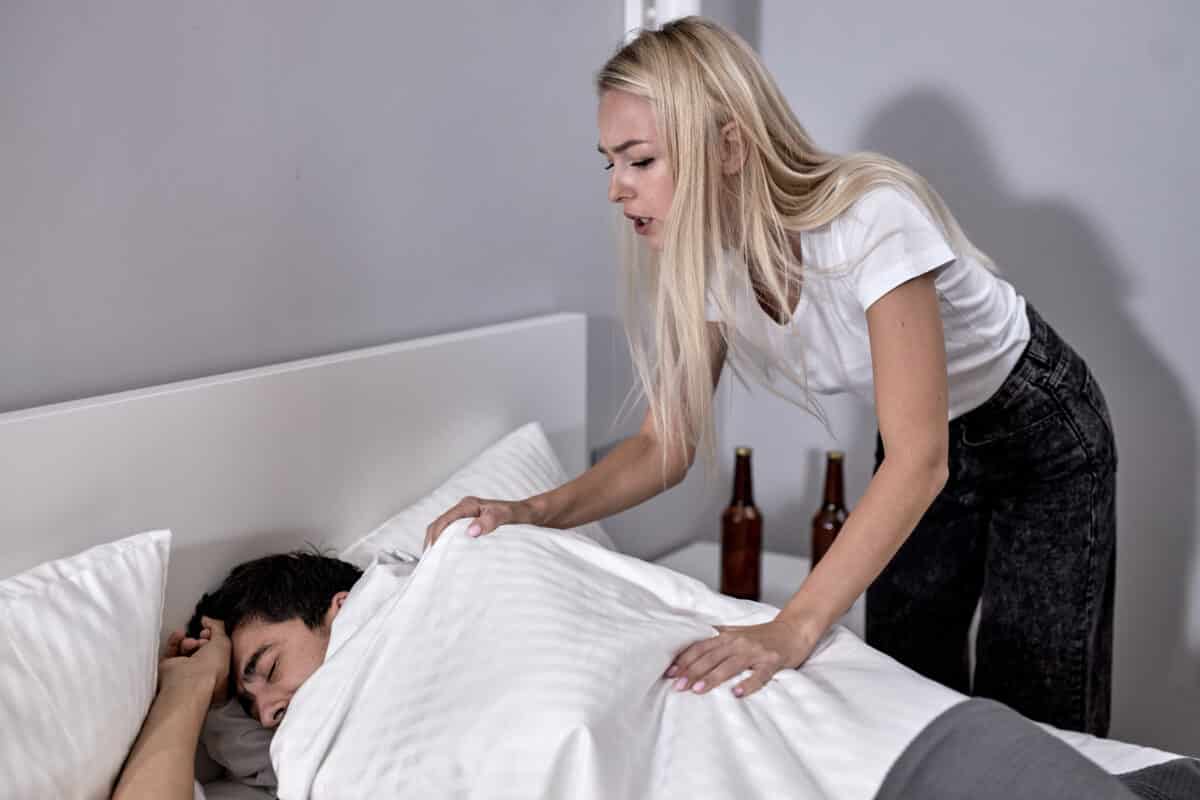There’s not a sadder circumstance than one with potential for a happy-ever-after that ends up being stuck in a sad, hopeless pattern. If your spouse is showing signs of alcoholism or excess drinking, this unfair scenario is likely one you relate to.
How to Tell Signs of Alcoholism
The following signs and symptoms from the Timberland Knolls Treatment Center lay out potential indications that your spouse has developed an alcohol abuse disorder:
Frequently using alcohol alone or in secret Feeling anxious or irritable if they can’t drink alcohol Being unable to stop their alcohol use once they start drinking Lying to or arguing with friends and family about their alcohol use Relying on alcohol to be happy or to deal with stress Using alcohol to help them wake up or get to sleep Feeling ashamed or guilty about their alcohol use
Pinelands Recovery Center provides an alcoholism definition on their site: “Alcoholism is defined by alcohol dependence, which is the body’s physical inability to stop drinking and the presence of alcohol cravings.“ Though diagnosing an alcoholic is not done when a certain number of drinks is surpassed, the NIAAA does define heavy drinking as 7-14 drinks per week on a consistent basis. Seven drinks a week being a potential heavy-drinking label for a female while fourteen drinks a week being the marker of a heavy-drinking male. It is important to note that it IS possible to be a heavy drinker and not be alcohol dependent. An alcoholism definition is achieved by a true dependence on drinking.
How to Talk to Your Spouse About Signs of Alcohol Addiction
If you’ve noticed signs that your spouse may be using alcohol in an inappropriate manner or are concerned that they may be addicted, it’s important to speak up.
Choose a time when your spouse is not drinking and you’re both calm and focused. Choose a place that’s quiet and private, where you won’t be interrupted—and turn off your phone and other devices to avoid distractions.Express your concerns in a caring way. Tell your loved one about the worries you have regarding their drinking. Share the effects it’s having on their health, your relationship, and the family as a whole. Try to remain neutral and be compassionate rather than judge your loved one’s behavior or try to shame them.Encourage your loved one to open up about the reasons why they’re abusing alcohol. For example, are they stressed, bored, lonely, or anxious? Many different factors could be contributing to their drinking, but to stay sober your loved one will need to address any underlying causes.Consider staging a family meeting or an intervention if you’d rather not go it alone. Again, everyone needs to come from a place of caring. Be sure no one uses this as an opportunity to bully, accuse, or vent their anger at the person with the drinking problem.
What to Avoid Saying When You See Signs of Alcoholism
There is no easy way to have a conversation about your concern for your spouse when they are struggling with alcohol abuse. However, the following tips will help you avoid saying or acting in a way that can be more harm than good.
Don’t take any negative reactions personally. It may take several attempts to begin a real conversation with your loved one about their drinking. Expect pushbacks and denial. Give the person time and space to come to terms with your concerns. Allow them to start to see the problem for themselves.Don’t attempt to threaten, punish, bribe, or preach. Avoid emotional appeals that only add to the problem drinker’s feelings of guilt and increase their compulsion to drink. Offer advice, not ultimatums.Don’t cover up for your loved one or make excuses for their behavior. Trying to shield them from their responsibilities will only prevent them from seeing the negative consequences of their drinking. It could even delay them deciding to get help for the problem.Don’t blame yourself. You aren’t to blame for your loved one’s drinking problem. You aren’t guilty or responsible for their behavior, and you can’t make them change.
support for spouses Dealing With alcohol addiction
I’m sure you’re aware of the many negative impacts to abusing alcohol, but the importance for speaking up is for more than just protecting your spouse. Experts encourage you to speak up because it protects YOU TOO. “Alcoholism is linked to codependency in relationships as well as abusive behavior both verbally and physically. Deterioration in married or unmarried couples often stems from arguments, financial troubles, and acts of infidelity or, worse, domestic violence.” Though we hope this healing journey starts with you and your spouse standing together up against this brutal addiction, it cannot {and will not} end there. You need others beside you on this journey. It may feel counterintuitive to clue outsiders in on problems within your marriage, but it’s important to recognize an alcohol addiction is an exception the rule. When it comes to addiction, you are NOT bad-mouthing your partner when you share the situation in an appropriate way with others who can help. In fact, the more support you have around you during this difficult journey to a hopeful recovery, the better! Consider couples therapy as a start to navigating the emotions your relationship is going through. And don’t hesitate to reach out to a trusted friend or family member who can be by your side. However you choose to pursue help or communicate with your partner on this challenging topic, know that you are not alone!



